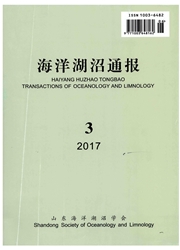

 中文摘要:
中文摘要:
以日角猛水蚤(Tisbe sp.)和日本虎斑猛水蚤(Tigriopus japonicus)为试验生物,采用高纯度CO_2和空气的混合气体调配试验所需酸化海水(pH值8.10、7.70、7.30、6.90、6.50),研究了海水酸化对2种桡足类摄食率的影响。海水酸化对日角猛水蚤摄食率的影响极显著(P〈0.01),对日本虎斑猛水蚤摄食率的影响显著(P〈0.05)。2种猛水蚤的摄食率随着海水pH值的下降呈现不同的变化趋势:日角猛水蚤的摄食率在pH值8.10和7.70时保持稳定,之后显著下降,而日本虎斑猛水蚤摄食率在pH8.10~7.30之间保持稳定,之后却显著上升。研究结果表明海水酸化对桡足类摄食率的影响具有物种差异,来自不同生境类型的桡足类对酸化的耐受能力也有所不同。
 英文摘要:
英文摘要:
In the present study,the effects of seawater acidification on ingestion rates of two harpaticiods:Tisbe sp.and Tigriopus japonicus were evaluated,which were exposed to seawater that had been equilibrated with CO2 and air to reach pH 8.10,7.70,7.30 and 6.50 for 4 hours.The ingestion rate was extremely significantly affected for Tz's.sp.(P〈0.01) and significantly affected for Tig.japonicus(P〈0.05) by seawater acidification.With the decrease of seawater pH value,the ingestion rates presented different trends between the two copepods.The ingestion rates of Tis.sp.remained stable at pH 8.10 and 7.70,and it sharply declined when the pH levels were less than 7.70.While the ingestion rates of Tig.japonicus rose outstandingly when the pH levels were less than 7.30,and they were stable when the pH ranged from 8.10 to 7.30.These results demonstrated that the effects of seawater acidification on the ingestion rates of copepods might be species-specific,and the copepods which came from different habitats might have different tolerant capabilities when facing ocean acidification.
 同期刊论文项目
同期刊论文项目
 同项目期刊论文
同项目期刊论文
 期刊信息
期刊信息
